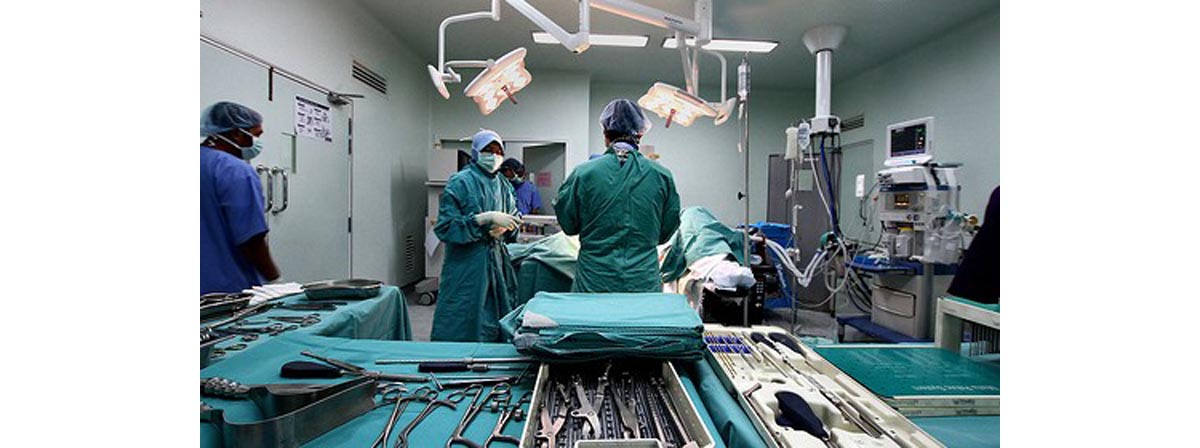Harvard-educated David Goldhill is the president of GSN, the Game Show Network on American television. He is also, as it turns out, an expert on the American healthcare system and health insurance policy, becoming a vocal critic of the system after his then 83 year-old father died of sepsis after entering a highly regarded, "well run" New York hospital for treatment of pneumonia.

When the senior Goldhill went to the hospital for the treatment of his pneumonia, he had been able to walk in the door. In less than 36 hours, however, David Goldhill's father had developed sepsis, an intractable and largely untreatable bacterial infection that slowly kills its victims from the inside out. Over the next five weeks, Goldhill, the son, sat with Goldhill, the father, and watched the enormously expensive American medicine that was claimed to be amazing be unable to save a life that was lost because someone during the first day of his father's treatment failed to wash his or her hands or observe basic sterilization procedures before treatment.
I know a little about watching your dad die of sepsis when the hospital is unable to help. In my own father's case, it was not a failing of sanitary procedure in the hospital, but that he came down with the disease. My own father, whose name was Raymond Rister, had been given a medication at the hospital that he did not need that had two side effects. One was shutting down his ability to urinate, and the other was aggravating dementia. My father had to be fitted with a catheter so he could pee, and he couldn't even remember why it was there so he kept pulling it out. My dad lived a little more than four weeks after his doctors pronounced him "not worth" saving.
David Goldhill's response to iatrogenic medicine has been to campaign for healthcare reform that really makes sense. But to do that, Goldhill argues, we need to start by dispelling the ideas that don't make any sense. With thanks to Mr. Goldhill, I'll restate 10 strange facts about healthcare that run counter to ordinary perceptions. Did you believe any of these strange things?
1. Healthcare is measured in terms of cost rather than in terms of price.
There's no doubt that healthcare costs have our attention, especially when we hear about procedures that cost $10,000 at one hospital and $100,000 at another. It's a crazy system that allows variation of 1000%, and even more at times, in the costs of well-established care. But during most years, most of us won't have to worry about undergoing any procedures at all. So what really makes an economic difference when we aren't even in the hospital, when we don't have to get any of those outrageously expensive hospital services?
It's the price of the healthcare, of course, the price that we have to pay, if we want to have health insurance, that creeps up on all of us each and every year. The Health Care Cost Institute tells us that not only did American health care cost $18,000 per family of four in 2011, but it cost $672 more than in 2010. It's the fact that it costs $50 per month per year that gets us, not the $250,000 for a cardiovascular stent that we never actually pay.
2. Healthcare isn't necessarily what makes us healthy.
Despite what the naysayers tell us, death rates from heart disease and cancer are actually down, slightly, and or life expectancies are actually up, and considerably. But it isn't necessarily the healthcare system that makes the difference. Fewer people smoke, more people get diagnostic procedures sooner, people don't even give a second thought to buckling up their seat belts when in a car (unlike 40 years ago, when protests of seat belt laws were all over the news), and suicide hot lines help prevent the despondent from ending their lives early. Much, Goldhill cites the New England Journal of Medicine's claim of about half, of health progress has relies on changes in people's lifestyle over the many years.
3. Health insurance and healthcare are not the same thing.
You can have health insurance and not get healthcare, and you get healthcare even if you don't have health insurance (although wheelbarrows filled with money would certainly help a lot). Having comprehensive health insurance that covers all kinds of healthcare costs does not necessarily mean you'll get the treatment you need when you need it.
Seven More Facts About Healthcare That Get Lost in Debate
One of Goldhill's most important observations about the fallacies of American healthcare thinking is one that you probably haven't even heard before. Are you ready?

4. Health insurance is not really insurance.
Traditional insurance is all about sharing risk (well, sharing risk in ways that also make money for the insurance company). Not everyone's house will burn down, but just about everyone carries fire insurance just in case. You pay a little premium to protect you against a big risk that might happen to you. The insurance company adds a little, or a lot, to make a profit by providing the service.
Health insurance, however, doesn't cover possibilities. It covers certainties. We all get sick sooner or later, and the insurance companies certainly want their profits. As Goldhill points out, with health insurance, we all pay a high health insurance premium and we all have to bear a lot of additional expense for a certain loss. The situation with health insurance is a lot like it would be for fire insurance if everybody's house burned down.
5. Medical procedures don't necessarily provide medical care.
Writing from personal experience, I maintain that if you've ever had not just one but two heart attacks, you have probably been offered not just one but two kinds of medical intervention, that is, if your insurance can pay for them. If you don't have insurance, you'll probably be offered coronary catheterization, angioplasty, and stenting, a $25,000 to $50,000 procedure that lets you go home the same day, in many cases. And if you have good insurance, you'll be offered coronary bypass, a major surgical procedure that costs about $250,000 and that requires a year's recovery time.
Sure, there are medical criteria for who gets a stent and who gets a bypass. But it's amazing that if, say, you don't have medical insurance when you have your first heart attack yet you do when you have your second, bypass becomes the medical care you need. It's certainly the medical care the hospital needs.
6. Technological innovation makes costs go down in almost every area of economic activity except healthcare.
When I was a kid, the whole family would pile into the car on Tuesday and Saturday nights to go to my uncle's house. As many as 15 people crowded into his and my aunt's tiny living room. The attraction? He had a color TV, a rare device that had cost him the inflation-adjusted equivalent of about $3,500.
Nowadays, 21" color television sets don't cost $3,500. Telephone calls from the US to Europe cost 5 cents a minute, not 5 dollars a minute. Your 54" high-definition large screen TV probably costs about 5% of the $10,000 I considered paying in on a trip to Japan in 2001, if that much. But the cost of medical care goes up each and every time the technology changes.
Of course, technology isn't all about price. It's also about added features. But most medical procedures cost the same as they did when they first came out, or maybe a little more, even if the technology has not changed.
7. Almost no hospital is truly non-profit.
About 2/3 of all hospital beds in the United States are provided by non-profit hospitals. About 1/3 of all hospital beds in the United States are provided by for-profit hospitals. Non-profit hospitals do provide charity care--about 5% of their total expenditures, on average, about 20% of non-profit hospitals spending less than 2% of their total operating costs on the provision of charitable care. So non-profit hospitals are free to charge what for-profit hospitals charge to offset about 95% of their operating expenses.
And non-profits do have to charge. Their doctors and nurses, with rare exceptions, don't work for free. They don't get discounts on supplies or medications. They don't pay taxes, but they do pay administrators and fund raisers, and they get payments from Medicare, Medicaid, and health insurance just like any other healthcare provider.
8. Hospital bills aren't really bills.
A few months ago I got a serious infection and I couldn't wait to see a doctor. I went to an ER. I never received an itemized statement, just a slip of paper that contained exactly two lines of information, thank you for choosing us and "pay $4,800.57 now." (For an American ER visit, that is not an unusually high bill.) And if you have insurance, you're probably going to get similar kinds of statements, noting that you or your insurers owe thousands of dollars, or hundreds of thousands of dollars, or millions of dollars, with essentially no explanation.
It's as if the hospital doesn't intend to tell you what they are charging for. And actually, they don't. Hospitals and doctors offices that get paid by insurance and government programs prepare their bills for their payers, not for you.
9. Obamacare won't bring most Americans new healthcare benefits.
For all the hoopla about the Affordable Care Act, for most Americans, the care they receive in 2014 will be identical to the care they received in 2013. Only the way it's paid for (or not) will change. A minority of people who can't access the healthcare system at all, however, will be covered by the changes.
10. Good medicine can't be one-size-fits-all.
When I was living in Germany, a country that has a hybrid system of private insurance and government payment, my host explained the function of the Rote Liste, the red list of prescription medications for which health plans would pay. "If it's in the Red List," my host said, "your doctor will make absolutely sure you take it even if it kills you. If it's not in the Red List, you won't get it even if you need it to stay alive." In other European countries, I've heard similar, not entirely hyperbolic, complaints about state-run medicine.
It remains to be seen whether the changes brought by the Affordable Care Act will result in top-down decisions that tell doctors how to practice medicine in ways that limit treatment options. We probably won't get a "European" system. There's still far too much money to be made through medical inefficiencies.
Good healthcare is about more than having good insurance, although having good insurance certainly helps. It's not going to be cheap, and if the system is to be run democratically, the available healthcare will almost always lag behind technological innovation. But to tackle the challenges of making our healthcare system work, we need to be clear about its basic realities.
- Goldhill, David. Catastrophic Care: How American Health Care Killed My Father and How We Can Fix it (New York: Knopf, 2013).
- Goldhill, David. How American Health Care Killed My Father. Atlantic Monthly. September 2009.
- Photo courtesy of New Media Ba by Picasa : lh4.googleusercontent.com/-XaxdEmqUnj4/TYceW6CNJ0I/AAAAAAAAHwo/IiRDiRBm6p0/s1024/pacijent%2520transport.jpg
- Photo courtesy of Phalinn Ooi by Flickr : www.flickr.com/photos/phalinn/8116033124/


Your thoughts on this